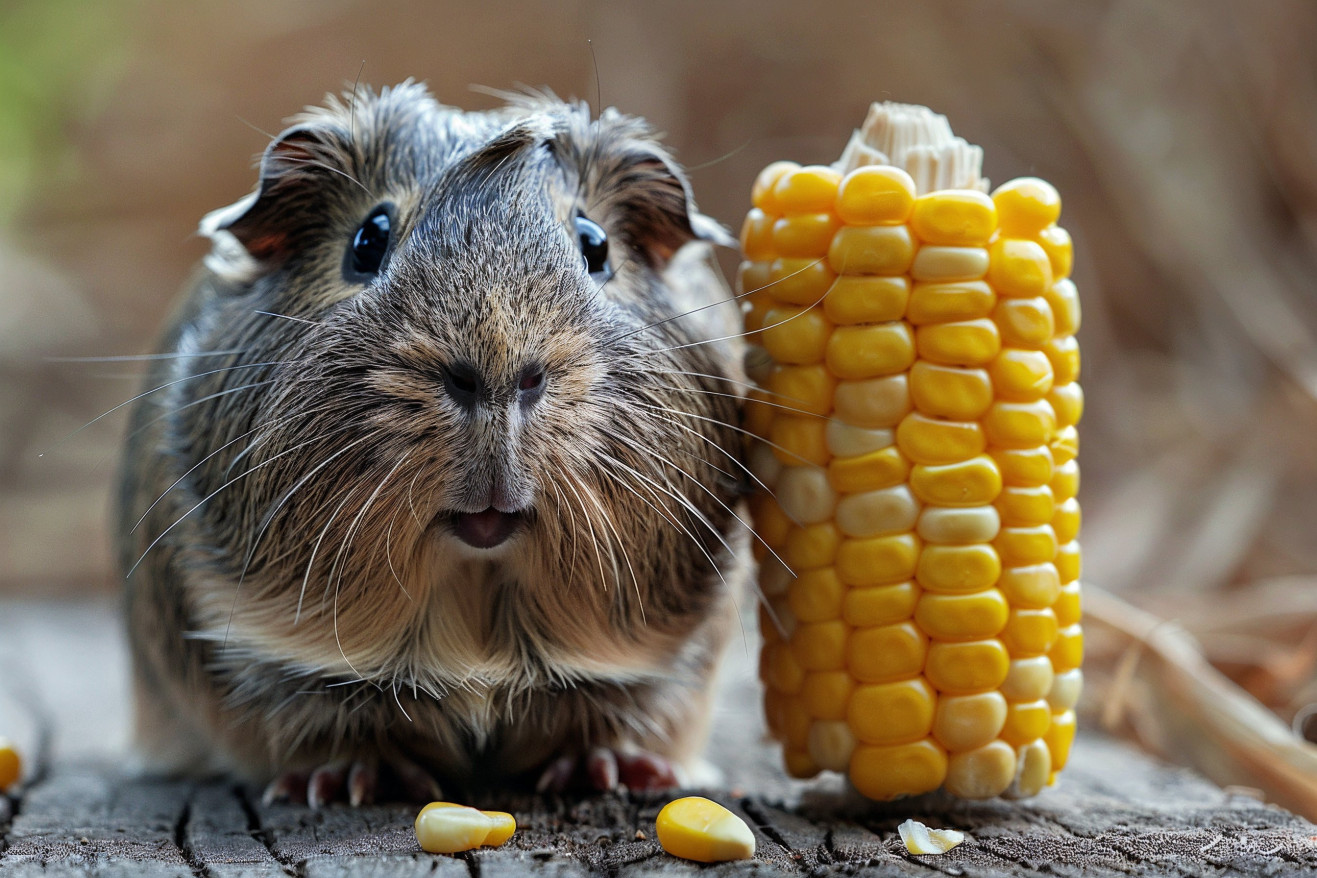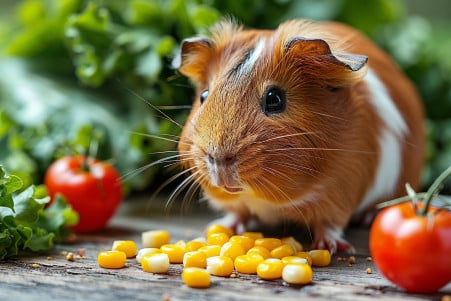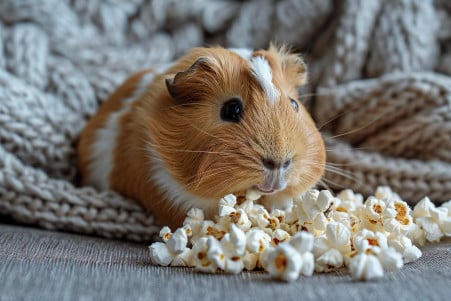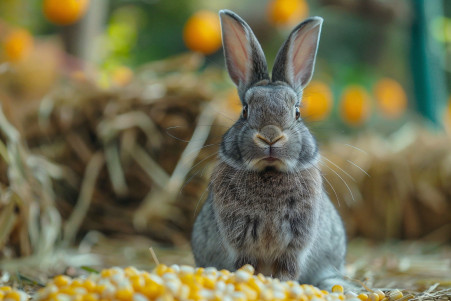Can Guinea Pigs Eat Corn on the Cob? A Nutritional Analysis
19 May 2024 • Updated 18 May 2024

Corn on the cob is a delicious treat for people, but is it safe for your guinea pig to eat? Guinea pigs can eat corn on the cob, but it should be given to them sparingly and as a treat. The cob should be avoided because it's hard for guinea pigs to digest. Instead, take the kernels off the cob and give your guinea pig a small amount a few times a week, since corn is high in sugar and carbs for these small herbivores.
We'll take a look at the nutritional value of corn and discuss what veterinarians have to say about adding corn and other fresh fruits and vegetables to your guinea pig's diet. By examining scientific studies and interviewing exotic animal vets, we'll cover portion sizes and other dos and don'ts when it comes to feeding corn on the cob to your guinea pig so that you can keep them as healthy as possible.
Can guinea pigs eat corn on the cob?
How Much and How Often Should You Feed Corn to Your Guinea Pig?
While guinea pigs can eat corn on the cob, it should be in moderation and as part of a well-balanced diet. According to GuineaDad, you should only feed the raw corn kernels to your guinea pig in small amounts, with 2-3 kernels per serving being the maximum. You should also only feed them the raw corn kernels a few times a week at most. On the other hand, the inner corn husks can be fed to your guinea pig daily, but make sure to wash them thoroughly to remove any pesticides. You can give the husks to your guinea pig whole or cut them into 1/4 to 1/2 inch strips to make it easier for your pet to eat them. The corn silk, or "hairs," can also be fed to your guinea pig daily.
That said, it's important to not overdo it. As noted on the Guinea Lynx Forums, corn is higher in carbohydrates and sugars than the hay, fresh vegetables, and guinea pig pellets that should be the main components of your pet's diet. When you do introduce new foods like corn, do so gradually and in small amounts so you can watch for any signs of digestive upset. If you're careful with portion sizes and make sure your guinea pig's diet is balanced, corn can be a fun and occasional addition to their diet.
What Can and Can't Guinea Pigs Eat?
The Guinea Pig Cages forum explains that guinea pigs can eat the corn kernels, husks, and silk. However, the outer corn husks and leaves should be removed to avoid potential contaminants or toxins. The Cali Cavy Collective blog explains that corn stalks and leaves can be given to guinea pigs as chew toys or enrichment, but they can be hard to digest if ingested.
It's also important to prepare them properly - the Guinea Pig Forum suggests washing corn husks and cutting them into smaller pieces to prevent choking hazards. As with any new food, it's important to introduce new parts of the corn plant slowly and in moderation to see how your guinea pig's digestive system responds.
Nutritional Profile and Health Benefits
According to the USDA Nutrient Database, corn kernels are a good source of fiber, potassium, vitamin B6, folate, and antioxidants for guinea pigs. However, corn is lower in other important nutrients like vitamin C and calcium and has an imbalanced calcium-to-phosphorus ratio, according to the Guinea Lynx Nutrition Charts. Meanwhile, the Translational Animal Science journal reports that corn husks and silk have a high fiber and low protein content, which is similar to hay and grass.
Although corn isn't the most nutrient-rich food, Hepper says it can still offer some health benefits when consumed in moderation as part of a well-rounded diet. That said, the NCBI Bookshelf warns that hay, fresh veggies, and guinea pig pellets should still account for most of a guinea pig's diet to make sure they get the nutrients they need.
As Chew Toys and Enrichment
Corn stalks can also be used as enrichment or chew toys for guinea pigs. As explained by the Cali Cavy Collective blog, chewing on corn stalks can help guinea pigs keep their teeth from getting too long. The Guinea Pig Forum says that corn stalks can be a natural, safe alternative to store-bought chew toys.
If you want to make sure that the corn stalks you give your guinea pig are free of pesticides, the Guinea Pig Cages forum suggests growing organic corn in your garden. Just make sure to introduce them slowly and watch for any signs of stomach upset if your pet eats them.
How to Prepare and Feed Corn
The Guinea Pig Forum explains that guinea pigs may not immediately recognize a full ear of corn as food, so it's best to remove the kernels from the cob before feeding. The Cali Cavy Collective blog suggests peeling off the outermost layers and cutting off the ends, which are often the dirtiest parts.
Once the husks are cleaned, they can be cut into smaller pieces to prevent choking. The blog also mentions that guinea pigs can eat the corn silks, which many guinea pigs enjoy. Any leftover husks can be dried and stored in a cool, dry place for later use.
Per Hepper, make sure to only feed guinea pigs fresh, raw corn kernels, and never give them frozen, canned, or cooked corn. Also, when you first introduce any new corn-based food, make sure to do so gradually and keep a close eye on your guinea pig for any signs of digestive issues.
Conclusion: Feed Corn on the Cob in Moderation
Corn on the cob can be fed to guinea pigs as an occasional treat, but it should be fed in moderation. The yellow kernels, husks, and silk are all safe for guinea pigs to eat, but the corn is higher in sugar and carbohydrates than the hay, veggies, and pellets that should be the main components of a guinea pig's diet.
Guinea Piggles recommends that guinea pigs are only fed 2-3 kernels of corn at a time and that this is done no more than a few times a week. The inner corn husks can be fed every day, but they should be washed and can be fed whole or shredded. The corn silk can also be fed every day as part of a balanced diet.
Squidgypigs warns that corn is high in starch and low in other nutrients, so it should only be fed as an occasional treat and not as a regular part of a guinea pig's diet. GuineaDad says that any new corn products should be introduced slowly and in small amounts to make sure that they don't cause digestive problems.
In the end, while guinea pigs can eat corn on the cob in moderation, hay, fresh veggies, and guinea pig pellets should be the main components of their diet to ensure they get the nutrients they need for good health.


